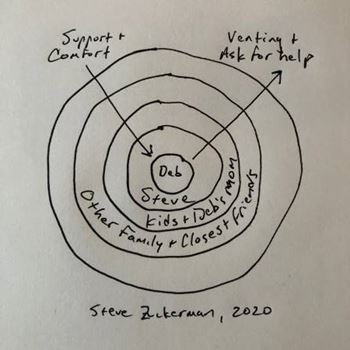Did we have a stroke?

Steve Zuckerman
Stroke survivor Debra Meyerson is a former Stanford University professor who taught and wrote about gender, diversity and identity. She is also the author (with her son, Danny) of Identity Theft: Rediscovering Ourselves after Stroke. Debra Meyerson and Steve Zuckerman, her husband of 33 years and “carepartner” after stroke, founded the nonprofit Stroke Onward to help survivors, families and caregivers navigate the emotional journey to rebuild their identities and rewarding lives. In this periodic column, they share their experiences and insights, and those of others contributing to this important aspect of recovery.
“Stroke is a Family Illness” is the title of Chapter 9 in my wife’s book, Identity Theft: Rediscovering Ourselves after Stroke. We borrowed that line from Leora Cherney, the founder of the intensive aphasia program at Shirley Ryan Ability Lab and a leader in research and clinical work to support people with aphasia. But no, I don’t say “we had a stroke,” just like I never said “we are pregnant” when Deb was expecting our three kids -- even though I planned to be a full partner in parenting.

That said, we firmly believe stroke very much IS a family illness. That’s not just because the whole family is impacted when a family member has a stroke. It’s a family illness because all members of the family are CHANGED by that stroke. Just as Deb has had to travel an emotional journey to rebuild her identity as a stroke survivor with disabilities, I have had to travel a similar, albeit less dramatic, journey of my own.
I received an email last week from a man whose wife suffered a stroke about 15 months ago at age 63. “It is a long and difficult journey,” he wrote. “Difficult for the stroke survivor, as the effort is exhausting. For me, the emotional and mental toll is hard.” That quote reflects why we formed Stroke Onward -- to support the emotional journey in recovery for survivors and their families.
Deb and I say all the time that we are reluctant to give advice to other survivors and families. As she says in the book, “every person is different; every stroke is different; every recovery is different.” We also say frequently that we have by no means “figured it out.” We are still on our journey and will be for life. But we do share observations from our experience in hopes they will be helpful for others. In that spirit, I offer the following.
Carepartner vs. caregiver
Caregiver is a very common term, but we use the term carepartner instead. That’s because Deb has always wanted to be an agent in her own recovery rather than a recipient of care, and also because we want to maintain our relationship as a partnership. Thus, our preference to avoid a label that defines one of us a giver, and the other a receiver.
It’s a marathon, not a sprint
I was fortunate to have several friends impress upon me shortly after Deb’s stroke that I would be no good to her, if I wasn’t healthy– both physically and emotionally. This observation could be just as aptly titled “take care of yourself too!” (OK, maybe I am willing to give a little advice.)
The "Ring Theory" of support

The person suffering a trauma – Deb in our case – is in the center of the ring (see the illustration). The second ring is for the person or people closest to the person affected – in our case, me. Other people can be put in successive rings, based on how close they are to the person at the center. Our third ring had our kids, parents and closest friends.
The basic rule is comfort and help going in – dump, complain or ask for help going out. For me this was really helpful – I could admit our trauma was partly “about me” but not with Deb. On the other hand, it let me reject “help” offered by others that wasn’t helpful (but would make THEM feel better) and ask friends and family for the help I really needed.
My identity journey

Of course my life was impacted by Deb’s stroke – more need to support her, picking up responsibilities she used to have, so many joint/family activities now out of reach. But I also decided that carepartner is part of my identity now. (Identity is a choice!) I often say the changes to my identity are less extreme than Deb’s, and less driven by the necessity of reduced capabilities. They are in all cases a function of choice.
For me the most rewarding choice was the decision to create Stroke Onward with Deb – to bring more purpose into our shared post-stroke lives. But it was also the most difficult. It has forced me to work less in my previously all-consuming career with an economic justice organization – work that I love and also has great meaning for me. This choice became obvious when I embraced carepartner as part of my identity.
Six magic words
About two years after Deb’s stroke, I almost hit a breaking point. Deb was, understandably, super frustrated – very often – because of her difficulties communicating and having only one usable hand. But sometimes when I tried to help, she’d get mad at me for not letting her be independent. So other times I’d let her struggle with something I could easily do, and she got mad at me for not realizing she needed help! Generally known for my patience, I felt like I was wrong no matter what and blew up at her more than a few times. The six words that changed (maybe saved?) our relationship – “Would you like me to help?”
This club of stroke survivors and carepartners is most certainly one we didn’t want to join. But we are in it, so we do our best to deal with it. Fortunately, Deb’s academic background studying identity put us on our five-year book-writing journey. That helped us recognize the need to focus on rebuilding our identities and to see just how critical the emotional journey in recovery really is. We hope that through the work of Stroke Onward we can build on the book’s impact and make that journey still more apparent – and a bit easier – for others who find themselves in this club that nobody wants to join.
We thank the American Stroke Association for enabling this column to help us do this important work. Please follow us on social media @strokeonward and visit us at strokeonward.org to learn more about our work and sign up for our newsletter.





